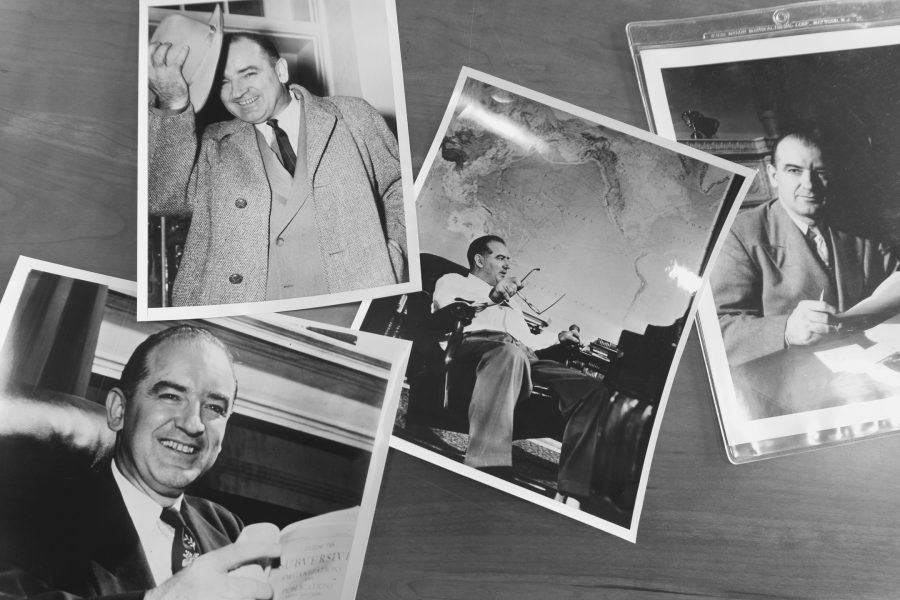
Stacy Mellantine // stacy.mellantine@marquette.edu
https://soundcloud.com/marquette-radio/a-forgotten-legacy
Famous Marquette University alumni include the likes of Dwyane Wade, Jimmy Butler and Chris Farley. Joseph McCarthy, who graduated with a law degree in 1935 and changed the American political sphere in ways that are still visible today, is among the famous alumni too.
“It is a safe bet that very few of the current students (at Marquette) are even aware that McCarthy is an alumnus. … This unawareness, however, is excusable. The halls, offices and classrooms of most law schools are teeming with portraits, plaques and busts of prominent alumni,” reads a 2001 article in the Marquette Law School Review. “It is not uncommon for law schools to name buildings, classrooms, courtrooms, professorships and scholarships after prominent graduates. At MULS, however, Joe McCarthy, undoubtedly the law school’s most famous alumnus, is persona non grata (an unwelcome person).”
McCarthy, who served as a Republican senator from 1947 until his death in 1957, is best remembered for the national campaign against communism he largely lead. McCarthy is one of the most visible faces of Cold War tensions and widespread fear in the United States.
Lowell Barrington, chair of the Political Science department whose teaching and research include post-Communist politics and courses on Authoritarianism, says McCarthy’s legacy is not one the university wants to advertise ties with.
“Part of the problem for Marquette latching onto him, is that ultimately why he was famous were these things that ended up being discredited… he didn’t have a long, grand political career,” Barrington says.
McCarthy contributed to what is referred to as the Red Scare, the idea that communism, anarchy and radical leftism were going to take over the country, and Soviet Russia had insurgents and sympathizers everywhere, even within the highest levels of government. The term ‘McCarthyism’ refers to the fanatical campaign that accompanied the Red Scare, where many people were falsely accused of being associated with the Communist Party, were blacklisted and lost their jobs. Today, the term is used to describe what is considered to be reckless unsubstantiated accusations, or public attacks on the character or patriotism of political opponents.
“He was certainly not the first by any means to engage in attacks and claims without actual factual basis,” Barrington says, noting however, those tactics are how McCarthy made his name.
Following McCarthy’s death, his widow Jean Kerr Minetti donated thousands of documents, letters, photographs and other relics of her late husband’s life and political career to Marquette’s Raynor Memorial Library Archives, which is located on the third floor. According to the archive’s website, the documents were closed to research use at the request of the donor, until her death in 1979.
Due to legal issues, the papers were not opened until 1988 when Joseph Minetti, whom Jean had married following her first husband’s death, turned over the remaining papers in his possession, including 9 cubic feet of McCarthy’s investigative files, and consented to the opening of all “clearly public” material, such as press clippings and recordings of speeches. The “private files” will remain closed until the death of his daughter Tierney Minetti, meaning there are multiple boxes that are still unavailable to the public.
Amy Cooper Cary, head of the Special Collections and University Archives, says, “We have one of the best collections in the country.”
The total collection comprises nearly 100 cubic feet of boxes. Students, faculty and staff can view the public files by going to the third floor archives office and submitting a request for the files to be brought out.
The idea of McCarthyism has resurfaced as a topic of conversation in American politics, as President Donald Trump’s political tactics have been compared to the McCarthy era. President Trump took to Twitter to compare the current investigation of himself and his associates for collusion during the 2016 election to the Red Scare. His post reads, “Study the late Joseph McCarthy, because we are now in (a) period with Mueller and his gang that make Joseph McCarthy look like a baby! Rigged Witch Hunt!”
The archive includes digitized audio records of the late Senator, in which his anti-communist tirades can be heard. Some of the recordings are available online, such as one where Senator McCarthy is speaking out against homosexuals in the State Department, arguing that homosexuals are susceptible to communist blackmailing and therefore pose a security risk. That was the first time he a list of alleged government subversives. Or in another recording where he claims some Harvard faculty members are communists, singling out Wendell Furry, a faculty member and scientist.
“In addition to that (McCarthyism) has come up in the context of (intergovernmental) investigations, it also connects to how in political science right now we’re dealing with waves of populism,” Barrington says.
“When theres any kind of populist movement, theres always a ‘other’ that is meant to mobilize people or mobilize support by essentially scaring them.”
While the validity of the Mueller investigation is a matter of opinion, the idea of political witch hunts and government corruption are fresh on the minds of politicians and their constituents.
“One of the things about the McCarthy period… is that there are things that he did that are the kinds of things that when democracies allow them to happen can start to erode people’s confidence in thew institutions and the democracy itself,” Barrington says.
